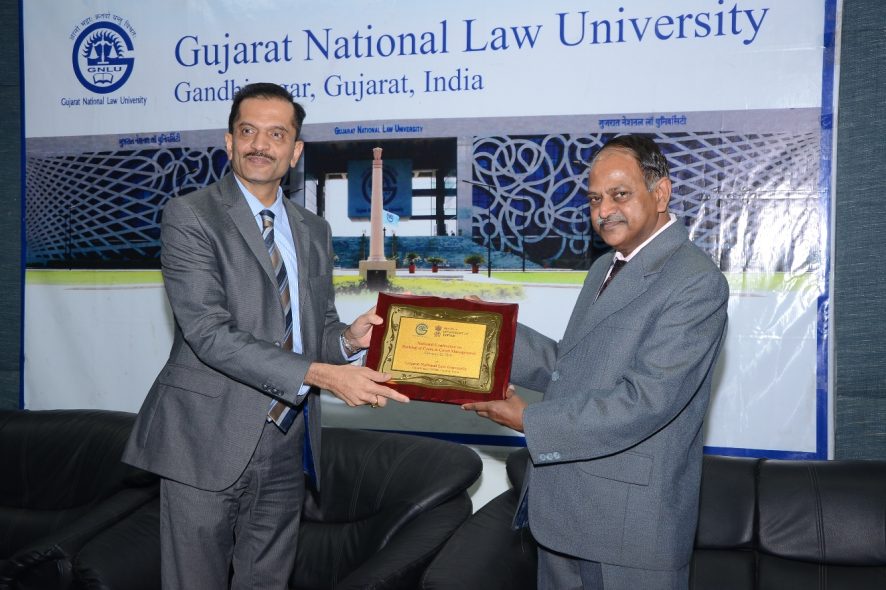Gujarat National Law University, Gandhinagar, under the aegis of Department of Justice, Ministry of Law & Justice organised the first of its kind “National Conference on Backlog of Cases & Court Management” on February 22, 2019. The main focus of the conference was the various aspects related to a backlog of cases in the Indian Judicial System and how it can be tackled through better court management system and other mechanism.
Judges, Court Managers, Academicians, Practitioners, Experts, Advocates, IPS officer, Research Scholars, Students participated in this seminar. The conference proved to be a wholesome experience for the fruitful discussions and the numerous views and opinions in the form of paper presentations.
Shri Narendra Modi, Hon’ble Prime Minister of India sent a message conveying his best wishes for the success of this conference. “The oft-quoted legal maxim ‘Justice delayed is justice denied’ should be the guiding principle for our judicial systems. it is imperative that our court management must be reformed to ensure minimum backlogs. This process will involve adopting more effective IT solutions, increasing the number of judicial officers and above everything, ensuring the full cooperation of the entire legal fraternity. The Government of India is committed to ensuring such an accessible and efficient judicial system for an inclusive nation,” his message reads.
Mr C. K. Reejonia, Director, Judicial Reforms, Department of Justice, Ministry of Law, Government of India inaugurated the conference in the presence of Dr Bimal N. Patel, Director of GNLU. Mr Reejonia said that it is important for state governments to implement the recommendations of the National Mission for Reforms in Pendency of Cases. “Handling of the backlog mainly depends upon the State Governments. The Central Government has a very limited role to play in terms of infrastructure only,” he said.
After the day-long deliberations and paper presentations, the conference came up with the following suggestions for reducing the backlog of cases:
- The Central Government should draft the proposed law in simple language which will save cost and valuable time of the Courts.
- The Central Government has adopted even more fictitious practice of bringing ‘Retrospective Amendments’ to the tax law. The Government has brought a number of retrospective amendments w.e.f 01.04.1961 and this makes interpreting the tax law even more difficult and affected the foreign investors’ confidence and much needed foreign direct investments.
- Continuous upgrade and training of court managers.
- Creation of permanent position instead of ad-hoc ones like court benches.
- Creation of research cell should be done under the guidance of judges.
- Setting up of Pre-Litigation Counselling Forum in all Police Units
- Setting up of Court work Monitoring System in all Police Units
- Use of private prosecution for speedy trial of criminal cases and to reduce the backlog of cases.
- Introduction of ADR mechanism within the structure of the already present system especially in criminal cases.
- Introduction of family conferencing and community conferencing in juvenile justice cases.
- Raising awareness about ADR.
- Police should be allowed to conduct negotiations before registering a problem, as it will help in decreasing the workload of the police and the backlog of cases.
- Court Managers should be given more powers so that the judicial officers can work which is of more judicial nature.
- Flagging of cases needed to emphasize on speedy disposal of important cases.
- Using online databases for sending of summons, collecting of information about convicts and updating the database.
- Using video-conferencing to record statements of witnesses.
- Using of AI to assist judges, in locating the central point of dispute in a case, so as to assist in speedy disposal of cases.
- Summons, adjournments and such other paperwork should not be thrust upon the judges, as the judicial time and skill are crucial to be preserved.
- Bifurcation of pending cases in order of importance.
- Upgrading the court managers with the help of technological advancement.
Dr Suryaprakash B, Director of DAKSH India, Bangalore, Mr. Shah Faisal M Kashmiri, General Manager of Bombay High Court, Nagpur Bench and Dr. Saseendran C., Scientist, NIC, Gandhinagar and Dr. Kalpeshkumar Gupta, GNLU participated in the panel discussion.








